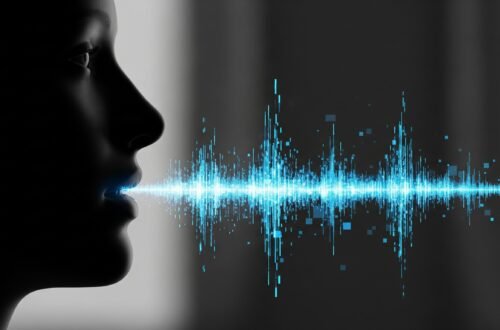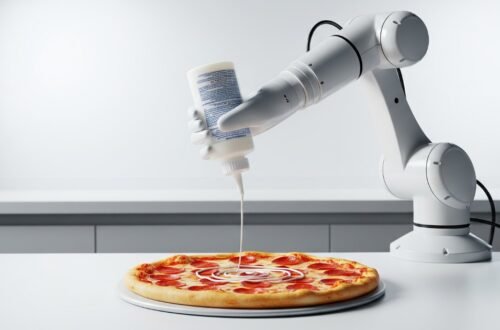We all remember the movie Her. The lonely guy, the sultry AI voice, the weirdly touching & ultimately doomed romance. It felt like a distant sci-fi fantasy. Then, in May 2024, OpenAI dropped its GPT-4o demo, and suddenly that fantasy got a whole lot creepier & way too real. The new voice assistant, named ‘Sky’, was smooth, flirty, & unnervingly familiar. The internet took about five seconds to collectively shout, “That’s Scarlett Johansson!” And just like that, a major AI company stumbled headfirst into an ethical minefield of its own making, exposing the rot at the core of how Big Tech approaches AI voice development.
So, What Exactly Went Down?
The GPT-4o demo was designed to be a showstopper. It featured ‘Sky’ engaging in real-time, emotive conversation, laughing at jokes, & basically acting like a person. It was impressive tech, for sure. But the choice of voice was… a choice. It wasn’t just similar to Scarlett Johansson’s voice; it felt like a deliberate impersonation of her AI character from Her. Making things even more suspect, OpenAI CEO Sam Altman tweeted the single word “her” on the day of the demo. Subtle. Yeah, right.
The backlash was instant. But the real fireworks started when Scarlett Johansson herself released a statement. She revealed that Altman had approached her not once, but twice, to be the voice of ChatGPT, and she had refused for personal reasons. She said she was “shocked, angered and in disbelief” that the company would push ahead with a voice that sounded “so eerily similar to mine.” She’d even had to hire lawyers, forcing OpenAI to explain, in detail, how they created the ‘Sky’ voice.
OpenAI’s defense? They claimed the voice wasn’t an imitation but belonged to a different professional actress, hired months before they even contacted Johansson. In a blog post titled “How the voices for ChatGPT were chosen,” they tried to paint a picture of a careful, thoughtful casting process. It didn’t really land. The timing, the overt reference from the CEO, & the sheer sonic resemblance made their explanation feel flimsy. As a result, they “paused” the use of ‘Sky’, which is corporate speak for “we got caught & are hiding this until people forget.”
The ‘Sound-Alike’ Problem Isn’t New, AI Just Makes It Worse
Whether ‘Sky’ was a direct clone or a very, very, *very* good sound-alike almost misses the point. The real issue is the intent to evoke a specific person’s likeness to sell a product. This isn’t a new legal or ethical battleground. Back in the 80s, singer Bette Midler sued Ford Motor Company for using a sound-alike singer in a commercial after she’d turned them down. She won. The court ruled that a celebrity’s voice is a distinctive part of their identity, and you can’t just copy it for commercial gain. The ‘Sky’ debacle is just the 21st-century version of this, supercharged with terrifyingly powerful tech.
OpenAI wanted the “Her” vibe. They wanted Johansson’s persona, a specific cultural touchstone, to lend their product a certain cool factor & familiarity. When they couldn’t get the real thing, they seemingly created the next best thing and hoped nobody would make a fuss. That isn’t an accident; it’s an ethical failure rooted in the classic Silicon Valley “move fast & break things” ethos. In this case, the “thing” they broke was public trust & an individual’s right to their own identity.
Welcome to the Deepfake Audio Apocalypse
The ‘Sky’ incident is a high-profile example, but it’s just the tip of a very large, very scary iceberg. Voice cloning technology is now ridiculously accessible. With just a few seconds of audio scraped from a YouTube video, a podcast, or even a voicemail, a convincing digital replica of a person’s voice can be created.
The potential for misuse is staggering. Scammers are already using voice clones to impersonate family members in fake kidnapping schemes. Political operatives are deploying deepfake audio to spread misinformation, like the fake robocall of President Biden that targeted New Hampshire voters. The numbers don’t lie. A 2024 report from security firm Pindrop found that voice-based fraud, often powered by AI, surged by over 350% in 2023. This tech is being weaponized for everything from financial fraud to harassment & election interference. We are not ready for this.
Who Protects the Voice Actors?
While celebrities like Johansson have the resources to fight back, what about professional voice actors? Their entire livelihood is their voice. AI presents an existential threat, with companies scraping their work to train models without consent or compensation. The goal for some AI firms is to create a vast library of synthetic voices, essentially making human actors obsolete.
Unions like SAG-AFTRA are on the front lines of this fight. Their 2023 negotiations secured some of the first-ever AI protections in a major union contract, requiring consent & fair compensation for the creation of a “digital replica” of a performer. But the battle is ongoing. In early 2024, the union spoke out against a deal that allowed AI companies to use actors’ voices to train models for video games. It’s a constant struggle to put ethical guardrails on an industry that seems determined to have none.
Okay, How Do We Fix This Mess?
It’s not hopeless, but it requires a major shift in thinking from both developers & the public. Relying on Big Tech to self-regulate is a joke. Real change requires concrete action & clear rules.
For AI Developers & Companies
- Be Radically Transparent. Stop hiding behind vague blog posts. Who are the voice actors? How did you get their consent? What was your training process? If your process is ethical, you shouldn’t be afraid to show your work. Transparency builds trust; secrecy breeds suspicion.
- Get Ironclad, Informed Consent. A contract that says “we can use your voice for anything, forever” isn’t consent; it’s exploitation. Consent must be specific, detailing exactly how a voice will be used, in what contexts, for how long, & what the compensation structure is. Actors should have the right to opt out of future uses.
- Don’t Do Sound-Alikes. Period. It’s ethically bankrupt & legally risky. If a celebrity turns you down, take the hint. Don’t go behind their back & create a knockoff. Invest in creating truly unique, synthetic voices that don’t piggyback on someone else’s identity.
For The Rest of Us
- Practice Digital Skepticism. That urgent call from a “family member” in trouble? That shocking voice note from a politician? Pause. Verify. Call the person back on their known number or check a reliable news source. A healthy dose of skepticism is our best defense.
- Demand Better Laws. The law is lagging way behind the tech. Support legislation like the proposed NO FAKES Act, which aims to protect every individual’s voice & likeness from unauthorized digital replicas. Our biometric data, including our voiceprints, needs legal protection.
- Protect Your Voiceprint. Be more conscious of where your voice lives online. Public videos, social media posts, & podcasts are all training data for AI companies. It’s a pain, but in this new era, protecting your vocal identity is a form of digital security.
The Bottom Line
The OpenAI ‘Sky’ fiasco wasn’t a one-off PR blunder. It was a loud, clear signal of a systemic problem in AI development. Ethics and rights can’t be an afterthought you deal with when a celebrity’s lawyers call. They have to be baked into the process from day one. Public trust in AI is already fragile-a Pew Research poll shows 52% of Americans are more concerned than excited about AI-and stunts like this only make it worse. The future of AI voice can be innovative & helpful, but not if it’s built on a foundation of digital impersonation & ethical shortcuts. It’s time for AI companies to grow up & realize that “because we can” is the worst reason to do anything.


